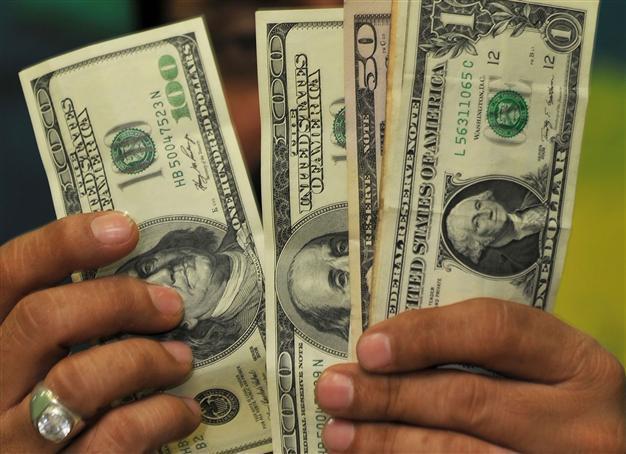Turkish central bank moves to bolster lira amid clashes
ISTANBUL - Reuters

The dollar/lira ratio, which was 1.9035 before the Central Bank’s announcement, plummeted to 1.8883 after the remarks. AFP photo
Turkish Central Bank organized fourth $50 million intra-day auction in a bid to stabilize the Turkish currency by raising the value of the lira against the dollar right after announcing its decision to embark on additional short-term fiscal tightening measures.
Turkey’s central bank intervened to bolster the lira today and the government said faster economic growth was in store, but the cost of insuring Turkish debt rose as markets took fright at fresh clashes between police and protesters in Istanbul.
Two weeks of protests against plans to redevelop an Istanbul park have spiralled into violent anti-government demonstrations across the country. That has fuelled losses in Turkish assets, which are also under pressure along with other emerging markets on uncertainty over the outlook for U.S. Federal Reserve policy.
Citing “international and domestic developments during the last month”, the central bank said it planned short-term extra policy-tightening steps through open market operations.
It began a $50 million forex-selling auction today, and will continue to hold such sales when it sees them as necessary. It skipped its usual fixed-rate repo auction.
It said it would also intervene directly in the forex market if needed.
The lira firmed after the announcement, having slumped to its weakest level against a euro/dollar basket since October 2011 in early trade. At 0920 GMT, the lira stood at 2.2075 against the basket, having weakened to 2.2.
But the cost of insuring Turkish debt against default rose to a 10-month high of 181 basis points, according to Markit data.
Benchmark two-year government bond yields also climbed, rising to 6.62 percent from 6.50 percent yesterday. Shares were 0.8 percent up on the day.
“Excessive volatility has been observed in the foreign exchange market due to international and domestic developments during the last month,” the bank said in a statement.
Riot police fired water cannon and teargas at protesters who threw stones and fireworks in Istanbul’s Taksim Squareon Tuesday, as the police entered the square for the first time since the start of June.
Prime Minister Tayyip Erdoğan called on protesters to withdraw from Gezi Park next to the square. He said the wave of anti-government demonstrations were part of a deliberate attempt to damage Turkey’s image and economy.
Inan Demir, an economist at Finansbank, said interbank and funding rates may climb depending on the centralbank’s actions.
“It is possible that the central bank could suspend funding the market at the 4.5 percent policy rate today. This would push both interbank rates and the effective funding rate for the banking system to the ceiling of the interest rate corridor, 6 percent,” Demir said.
Ratings agency Moody’s said yesterday that the protests across Turkey will become increasingly credit-negative the longer they last and have heightened risks to the country’s balance of payments.
Emerging markets have been thrown into turmoil since the U.S. Federal Reserve said it could begin slowing the pace of its bond-buying with new money in the months to come.
Countries with obvious domestic problems as well have borne the brunt.
